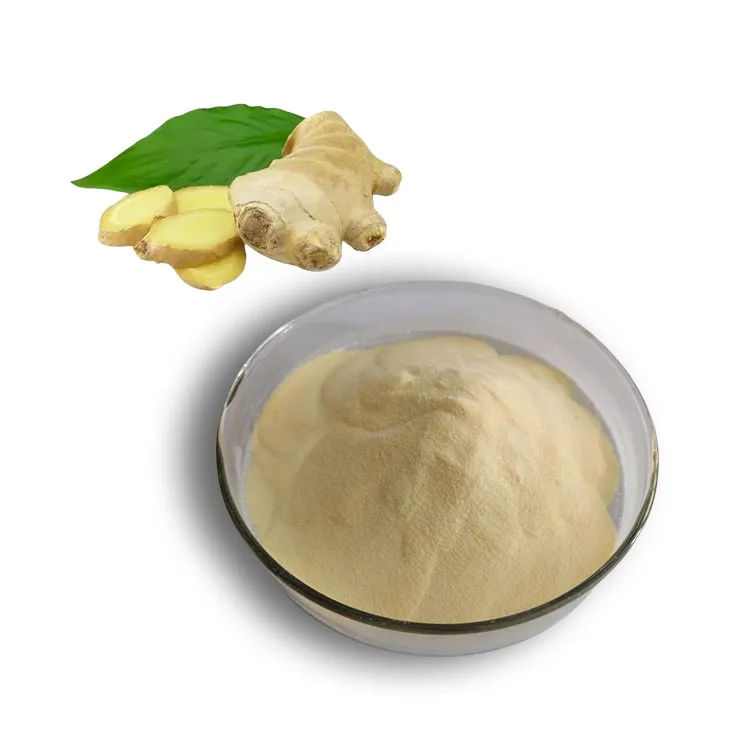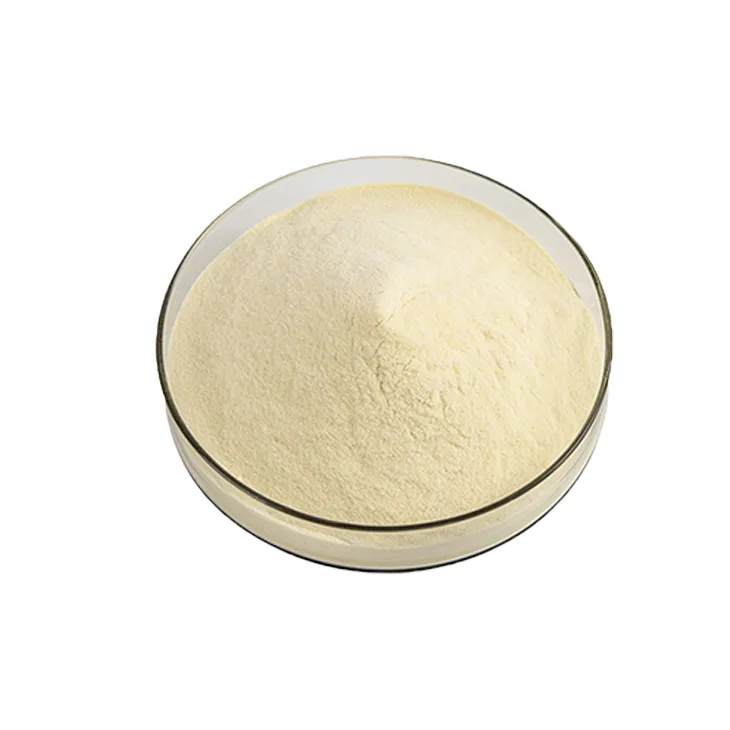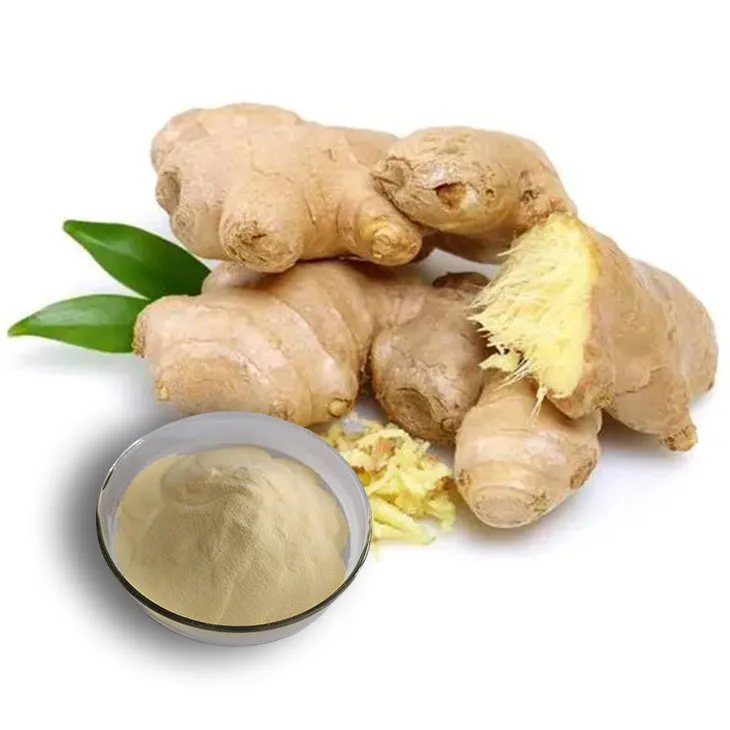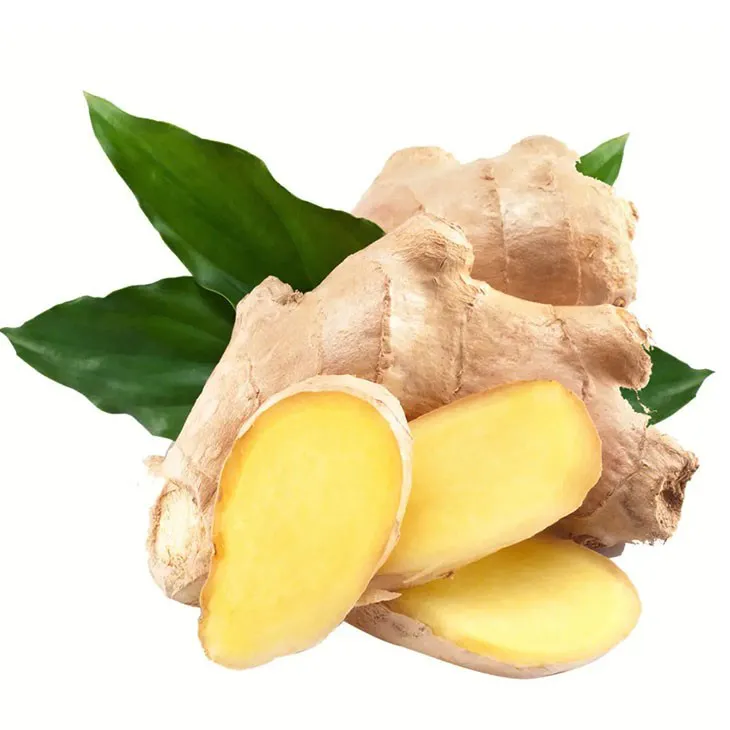- 0086-571-85302990
- sales@greenskybio.com
Ginger Extract: Uses, Advantages and Manufacturing Processes
2024-11-12

1. Introduction
Ginger has been an important part of human culture and health for centuries. Ginger Extract, obtained from the ginger root, has gained significant attention in recent years due to its wide range of applications. This extract is rich in various bioactive compounds that contribute to its multiple uses in different industries.

2. Uses of Ginger Extract
2.1 Food Industry
In the food industry, Ginger Extract is highly valued as a flavor enhancer. It imparts a distinct warm and spicy flavor to a variety of products. For example:
- Dishes: It can be added to stir - fries, curries, and soups, enhancing the overall taste profile. In Asian cuisines, ginger is a staple ingredient, and ginger extract can provide a more concentrated and consistent flavor.
- Beverages: Ginger ale, tea, and some specialty cocktails often contain ginger extract. The spicy and refreshing taste of ginger makes these beverages more appealing. For instance, in ginger tea, the extract can be used to intensify the ginger flavor without the need for large amounts of fresh ginger.
- Confectioneries: Gingerbread, cookies, and candies may also incorporate ginger extract. It gives these sweet treats a unique spicy - sweet balance that is loved by many consumers.
2.2 Pharmaceutical Field
The pharmaceutical field has recognized the numerous health - promoting properties of ginger extract.
- Anti - inflammatory: Ginger extract contains compounds such as gingerols and shogaols that have anti - inflammatory effects. These can help in reducing inflammation in the body, which is associated with various diseases such as arthritis. Studies have shown that regular consumption of ginger extract may help alleviate joint pain and swelling.
- Antioxidant: It is a powerful antioxidant, which means it can help combat oxidative stress in the body. Oxidative stress is caused by an imbalance between free radicals and antioxidants in the body and is linked to aging, cancer, and other chronic diseases. By neutralizing free radicals, ginger extract may contribute to overall health and disease prevention.
- Anti - nausea: One of the well - known properties of ginger extract is its ability to relieve nausea. It is often used to combat motion sickness and morning sickness in pregnant women. Ginger extract can be taken in various forms, such as capsules or tinctures, to ease the feeling of nausea.
2.3 Cosmetic Applications
In the cosmetic industry, ginger extract has also found its place.
- Improving blood circulation in the skin: Ginger extract can dilate blood vessels in the skin, which improves blood circulation. This can give the skin a healthy glow and may also aid in the delivery of nutrients to the skin cells.
- Anti - aging effects: Some studies suggest that the antioxidant properties of ginger extract may contribute to anti - aging. By reducing oxidative stress in the skin, it may help prevent wrinkles, fine lines, and other signs of aging. As a result, ginger extract can be found in various skincare products, such as creams, serums, and masks.

3. Advantages of Ginger Extract
3.1 Natural Product
One of the major advantages of ginger extract is that it is a natural product. In a world where consumers are increasingly conscious about what they put in and on their bodies, natural ingredients are highly sought after. Ginger extract offers an alternative to synthetic substances, which may have potential side effects or be less well - tolerated by the body. It is often perceived as a safer and more "clean" option, especially in the food and cosmetic industries.
3.2 Long Shelf - life
When properly processed, ginger extract has a relatively long shelf - life. This is beneficial for both manufacturers and consumers. For manufacturers, it allows for easier storage and distribution, reducing the risk of product spoilage. Consumers can also store ginger extract products for longer periods without worrying about them going bad quickly. This long - lasting quality makes ginger extract a convenient ingredient to use in various products that may not be consumed or used immediately.
3.3 Well - Tolerated
Generally, ginger extract is well - tolerated by most people. Compared to many pharmaceutical drugs, it has minimal side effects. While some individuals may experience mild gastrointestinal discomfort in rare cases, for the majority, ginger extract can be consumed or used without significant adverse reactions. This makes it a suitable option for a wide range of applications, from regular dietary supplementation to cosmetic use.

4. Manufacturing Processes of Ginger Extract
4.1 Selection and Washing of Ginger Roots
The manufacturing process of ginger extract begins with the careful selection and washing of fresh ginger roots. High - quality ginger roots are chosen, ensuring that they are free from diseases, pests, and excessive damage. After selection, the roots are thoroughly washed to remove dirt and impurities. This step is crucial as it helps to ensure the purity of the final extract. The roots are usually washed under running water until they are clean.
4.2 Drying of Ginger Roots
Once the ginger roots are clean, they are dried to reduce moisture content. There are different methods for drying ginger, such as:
- Air - drying: This is a traditional method where the ginger roots are spread out in a well - ventilated area and allowed to dry naturally. Air - drying can take several days to weeks, depending on the environmental conditions. However, it is a relatively simple and cost - effective method.
- Low - temperature drying: In modern manufacturing processes, low - temperature drying is often used. This method involves using specialized drying equipment that can control the temperature and humidity. Low - temperature drying helps to preserve the bioactive compounds in the ginger, as excessive heat can degrade these compounds. It also speeds up the drying process compared to air - drying.
4.3 Grinding into Powder
After drying, the ginger roots are ground into a fine powder. This powder form makes it easier to extract the desired components from the ginger. The grinding process should be carried out carefully to ensure a consistent particle size. A fine powder allows for a more efficient extraction process as it provides a larger surface area for the solvents to interact with the ginger compounds.
4.4 Extraction Process
The extraction process is a key step in obtaining ginger extract. Solvents such as ethanol or water can be used, depending on the specific components that need to be extracted.
- Ethanol extraction: Ethanol is a commonly used solvent for ginger extraction. It is effective in extracting a wide range of bioactive compounds, including gingerols and shogaols. Ethanol - based extraction is often preferred in the pharmaceutical and cosmetic industries where a more concentrated and pure extract is required. However, the use of ethanol requires proper handling and safety measures due to its flammability.
- Water extraction: Water extraction is a more natural and simple method. It is suitable for obtaining extracts that are mainly used in the food industry. Water can extract some of the flavor - related compounds from ginger, but it may not be as effective as ethanol in extracting all the bioactive components. Nevertheless, water - extracted ginger extract is often considered a more "natural" option for food products.
4.5 Filtration and Concentration
After the extraction process, the mixture is filtered to remove any solid particles. Filtration can be done using various types of filters, such as filter paper or membrane filters. This step helps to obtain a clear extract. Subsequently, the filtered extract is concentrated to increase the concentration of the active components. Concentration can be achieved through methods such as evaporation under reduced pressure. The final product is the pure ginger extract, which can then be used in various applications depending on its intended use.

5. Conclusion
Ginger extract is a versatile and valuable product with a wide range of uses, numerous advantages, and a well - defined manufacturing process. Its applications in the food, pharmaceutical, and cosmetic industries continue to grow as more research is conducted on its properties. As a natural product with a long shelf - life and good tolerability, ginger extract has the potential to be further explored and utilized in various innovative ways in the future.
FAQ:
What are the main uses of ginger extract in the food industry?
Ginger extract is mainly used as a flavor enhancer in the food industry. It adds a warm and spicy flavor to various dishes, beverages, and confectioneries.
How does ginger extract work in the pharmaceutical field?
In the pharmaceutical field, ginger extract has anti - inflammatory, antioxidant, and anti - nausea properties. It can relieve pain, reduce oxidative stress, and is often used to deal with motion sickness and morning sickness.
What are the advantages of ginger extract?
Ginger extract is a natural product, which is more attractive to those who are looking for alternatives to synthetic substances. It has a relatively long shelf - life when properly processed, facilitating easy storage and distribution. Also, most people tolerate it well, and it has fewer side effects compared to many pharmaceutical drugs.
What are the steps in the manufacturing process of ginger extract?
The manufacturing process of ginger extract includes several steps. First, fresh ginger roots are carefully selected and washed to eliminate dirt and impurities. Then, they are dried (either by air - drying or low - temperature drying) to reduce moisture content. After drying, the ginger is ground into a fine powder. The extraction can be carried out using solvents like ethanol or water depending on the components to be extracted. Finally, through filtration and concentration, the pure ginger extract is obtained.
Why is ginger extract used in skincare products?
Ginger extract is used in skincare products because it can improve blood circulation in the skin and may have anti - aging effects.
Related literature
- The Therapeutic Potential of Ginger Extract in Inflammatory Diseases"
- "Ginger Extract: A Natural Flavor and Its Applications in the Food Industry"
- "Ginger Extract in Cosmetics: Benefits and Manufacturing Considerations"
- ▶ Hesperidin
- ▶ Citrus Bioflavonoids
- ▶ Plant Extract
- ▶ lycopene
- ▶ Diosmin
- ▶ Grape seed extract
- ▶ Sea buckthorn Juice Powder
- ▶ Fruit Juice Powder
- ▶ Hops Extract
- ▶ Artichoke Extract
- ▶ Mushroom extract
- ▶ Astaxanthin
- ▶ Green Tea Extract
- ▶ Curcumin
- ▶ Horse Chestnut Extract
- ▶ Other Product
- ▶ Boswellia Serrata Extract
- ▶ Resveratrol
- ▶ Marigold Extract
- ▶ Grape Leaf Extract
- ▶ New Product
- ▶ Aminolevulinic acid
- ▶ Cranberry Extract
- ▶ Red Yeast Rice
- ▶ Red Wine Extract
-
Avocado Extract Powder
2024-11-12
-
Acerola Extract
2024-11-12
-
Sea buckthorn oil
2024-11-12
-
Longan Extract
2024-11-12
-
Hawthorn Extract
2024-11-12
-
Saffron Extract Powder
2024-11-12
-
Angelica sinensis extract
2024-11-12
-
Citrus bioflavonoids
2024-11-12
-
Grape Leaf Extract
2024-11-12
-
Bayberry Extract
2024-11-12





















